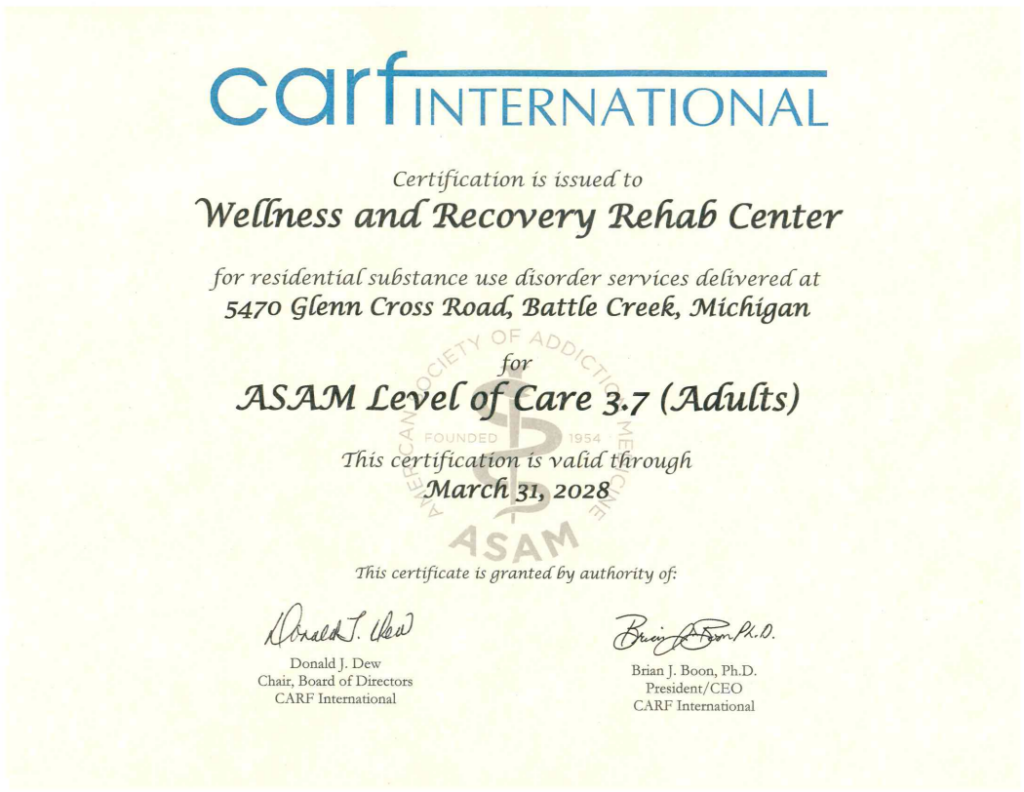Our Michigan inpatient drug rehabs are often referred to as residential treatment programs. We provide specialized facilities dedicated to helping individuals recover from substance abuse and mental health disorders. These centers provide a structured environment where patients can focus entirely on their recovery, free from the distractions and temptations of everyday life. Typically, inpatient rehab requires a person to stay at the facility for a prolonged period, often ranging from 28 days to several months, depending on the severity of their condition and their specific needs.
During this time, patients receive intensive therapeutic services, including individual counseling, group therapy, medication management, and holistic treatments such as yoga or art therapy. The primary goal of inpatient rehab is to equip individuals with the tools and strategies necessary to achieve long-term sobriety and mental wellness while also addressing underlying issues that may have contributed to their addiction or mental health challenges. The round-the-clock care and support provided in these facilities can play a crucial role in the recovery process, offering a safe and nurturing environment where individuals can heal and rebuild their lives.
Best Michigan Inpatient Drug Rehabs Staff and Qualifications

The staff at our Michigan inpatient drug rehabs are a key component of the recovery process, offering expertise, support, and compassion to individuals on their journey to wellness. These multidisciplinary teams often include doctors, nurses, therapists, and counselors who hold specialized qualifications in addiction and mental health treatment. Medical professionals like psychiatrists and addiction medicine physicians ensure that any medical needs are addressed, including the management of withdrawal symptoms and the provision of appropriate medications.
Psychologists and licensed counselors provide individual and group therapy sessions, utilizing evidence-based approaches such as cognitive-behavioral therapy (CBT) and dialectical behavior therapy (DBT) to help patients understand and manage their conditions. Additionally, holistic practitioners may offer complementary therapies like acupuncture, mindfulness meditation, and nutritional counseling, which can be vital in addressing the whole person. The staff’s collective expertise and dedication create a supportive and effective environment conducive to recovery, ensuring that each patient receives personalized care tailored to their unique needs.
Michigan Inpatient Drug Rehabs Steps to Admission into Treatment

- Initial Inquiry and Assessment: The admission process typically begins with an initial inquiry, often via a phone call or online contact form. During this phase, a representative from the inpatient rehab center will gather preliminary information about the individual’s condition, medical history, and treatment needs. This initial assessment helps determine whether the facility is a suitable fit for the individual’s specific situation.
- Pre-Admission Screening: Following the initial inquiry, a more comprehensive pre-admission screening takes place. This may involve a detailed interview conducted by a medical professional or counselor. The purpose of the screening is to assess the severity of the individual’s condition, identify any co-occurring mental health disorders, and determine the most appropriate treatment plan.
- Insurance Verification and Financial Planning: Once the screening is completed and the individual is deemed a suitable candidate for treatment, the next step involves verifying insurance coverage and discussing financial arrangements. The rehab center’s admissions team will work with the individual’s insurance provider to confirm benefits and coverage for the treatment program. If necessary, they will also discuss alternative payment options or financial assistance programs.
- Medical Evaluation: Prior to admission, a thorough medical evaluation is conducted to ensure that the individual is medically stable and ready for treatment. This evaluation is performed by a physician or nurse and may include a physical examination, lab tests, and a review of the individual’s medical history.
- Admission and Orientation: On the day of admission, the individual arrives at the facility and goes through a formal intake process. This includes completing necessary paperwork, receiving an orientation to the program, and meeting with members of the treatment team. They may also receive a tour of the facility to become familiar with their new environment.
- Personalized Treatment Plan Development: After admission, the treatment team works collaboratively to develop a personalized treatment plan tailored to the individual’s unique needs. This plan outlines the specific therapies, interventions, and goals for the duration of their stay in rehab, ensuring a structured and comprehensive approach to recovery.
Statistics of Success Going into Rehab
Our Michigan inpatient drug rehabs staff knows the success rates of individuals undergoing inpatient rehabilitation vary greatly depending on several factors, including the type of substance being treated, the presence of co-occurring mental health disorders, and the individual’s commitment to their recovery program. According to the National Institute on Drug Abuse (NIDA), research indicates that most individuals who complete inpatient rehab and follow up with continuous care have positive outcomes. Approximately 40% to 60% of patients in treatment for substance use disorders achieve sustained sobriety, which is comparable to the success rates of treatments for other chronic diseases like diabetes and hypertension.
Furthermore, data suggests that longer stays in rehab contribute to higher success rates. Individuals who complete at least 90 days of treatment show significantly better outcomes in terms of long-term sobriety. Additionally, the integration of relapse prevention programs and continuous support through aftercare services, such as outpatient therapy and support groups, enhances the likelihood of maintaining sobriety.
It is also noteworthy that customized treatment plans, which address both the addiction and any underlying psychological issues, significantly improve the chances of success. Holistic approaches that incorporate therapies like family counseling, cognitive-behavioral therapy, and medication-assisted treatment show increased efficacy in achieving long-term recovery. Ultimately, while there are no guarantees, the structured and supportive environment provided by inpatient rehab centers is a crucial step towards sustainable recovery.
Michigan Inpatient Drug Rehabs Explain Benefits
Our Michigan Inpatient alcohol detox centers offer a multitude of benefits for individuals struggling with addiction, providing a structured and supportive environment that is crucial for long-term recovery. One of the primary advantages is the immersive nature of inpatient care, which removes patients from triggers and environments that may contribute to their substance use. This seclusion from daily stressors allows individuals to focus entirely on their recovery without external distractions.
Another significant benefit is the comprehensive medical and psychological support available around the clock. Inpatient facilities are staffed by a multidisciplinary team of healthcare professionals, including doctors, nurses, therapists, and counselors, ensuring that patients receive holistic care. Immediate access to these professionals means that medical issues, such as withdrawal symptoms, can be promptly addressed, and ongoing therapeutic support can be provided.
Michigan Inpatient Drug Rehabs Utilizing Evidenced Based Practices
Our Michigan inpatient drug rehabs also benefits individuals by offering a variety of evidence-based treatment modalities tailored to their specific needs. Programs often include individual therapy, group therapy, family counseling, and complementary therapies like art or music therapy. These diverse approaches help to address the root causes of addiction, improve coping strategies, and build a solid foundation for long-term sobriety.
Additionally, the highly structured daily routine of inpatient rehab helps instill discipline and creates a sense of stability. This predictable schedule supports patients in developing healthy habits and routines that can be carried over into their lives post-treatment. The supportive community within the facility fosters connections with peers who are going through similar experiences, providing a network of emotional support that can be invaluable in battling the isolation often associated with addiction.
Our Michigan Inpatient Drug Rehabs Can Help Today

Wellness and Recovery Rehabilitation Michigan inpatient drug rehabs can help you today. We provide medical supervised programs. Our experienced doctors and credentialed substance abuse counselors will guide you to long-term recovery. We accept some health insurance and can verify on the phone. Call us now at 1-855-734-2202.
Overall, the intensive care and supportive environment provided by inpatient rehab centers make them an effective option for individuals seeking to overcome addiction and achieve long-term recovery. Inpatient rehabilitation centers offer an invaluable resource for individuals seeking to break free from the grip of addiction.
With a structured environment, comprehensive care, and personalized treatment plans, these facilities provide the essential support needed for sustainable recovery. While the journey to sobriety is challenging, the tools and strategies acquired during inpatient rehab can significantly enhance the likelihood of long-term success, paving the way for a healthier, more fulfilling life.




